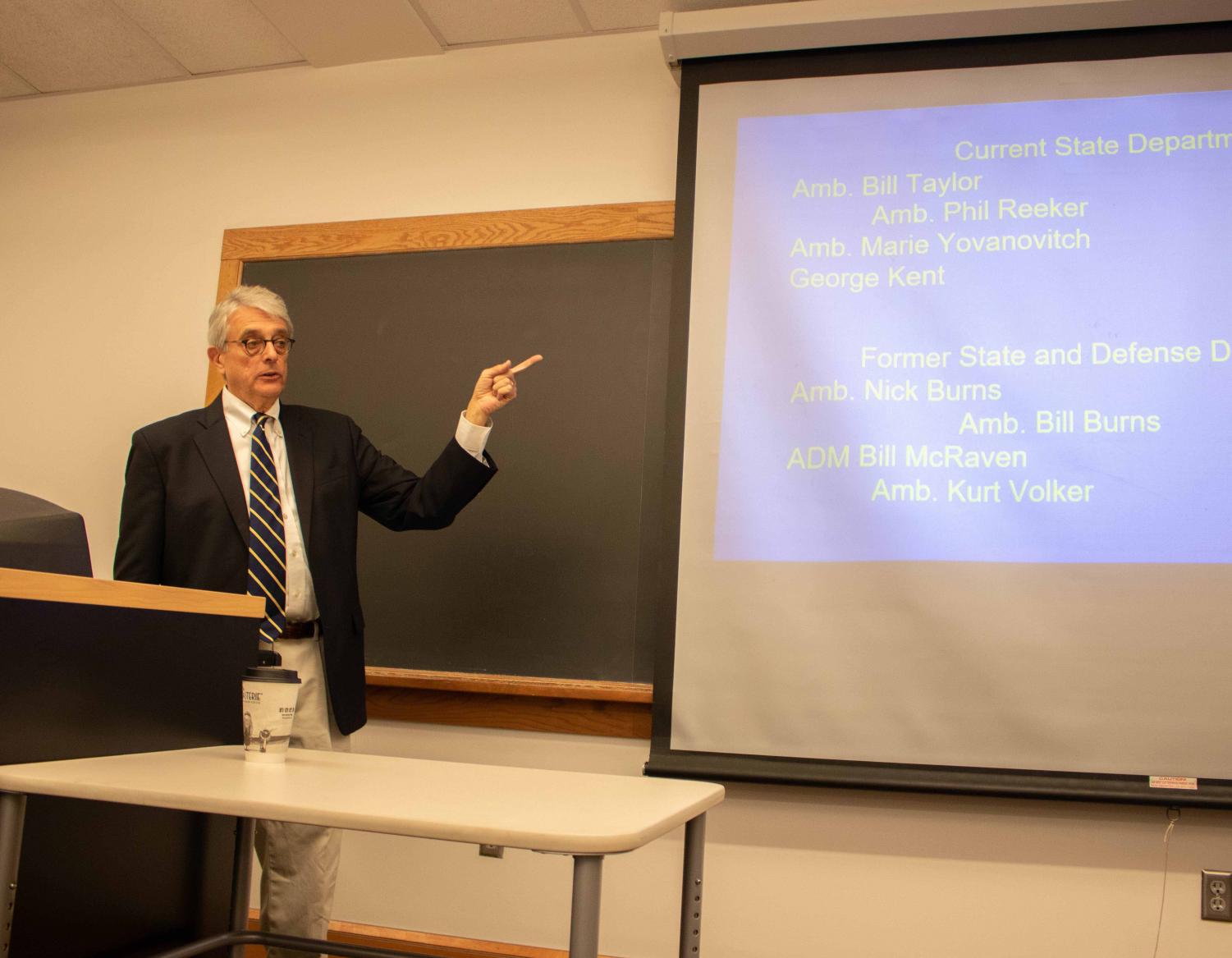UNI alum discusses foreign policy
Oct 31, 2019
On Monday, Oct. 28, at 5 p.m., UNI alumnus and former U.S. Ambassador to Mongolia John Dinger held a forum in Sabin Hall titled “When Politics Trumps Expertise: Ukraine, Turkey, Syria and Foreign Policy Making in the Trump White House.”
Speaking to an audience of about 50 students, faculty and community members, Dinger described his decades-long career in the U.S. Foreign Service, explained the bureaucratic process behind U.S. foreign policy and criticized the current president’s tendency to ignore it.
Dinger was introduced by Scott Peters, head of the UNI Department of Political Science, who discussed Dinger’s experience with foreign affairs and his connection to UNI.
“We are very lucky to have him back on campus today. We all know what is happening in the State Department, so it will be interesting to hear about how foreign policy is made normally,” Peters said.
Dinger was clear about the profound impact that UNI had on his political formation. When he was about to graduate with a political science degree in 1974, Robert Ross, former head of the UNI Department of Political Science, told Dinger the eight words that, according to him, changed his life.
“He asked, ‘Have you ever thought of the Foreign Service?’ I had never even heard of it, so I asked what it was and the rest, as we say, is history. Nine months later, I was in D.C. going through the orientation course, in a year I was working on my first assignment in London,” Dinger said.
Dinger explained “the food chain for foreign policy,” in which committees make decisions from the bottom up. Bureaucrats with a career in foreign politics, like Dinger, are involved with the Sub-Policy Coordination Committee meetings, the lowest level, but have very little to do with high-level committees such as National Security Council, where the president and cabinet officials are involved. These higher officials discuss more prevalent, “front-page” issues, like U.S. relations with Ukraine or Turkey.
Dinger pointed out the irony that, in his opinion, the higher you move up this “food chain,” the more ignorant the committee members are on foreign issues.
“Career people had several assignments in [specific areas of the world], [but] going up the food chain you get to people like Mike Pompeo, former Congressman from Kansas, so it is a little bit disconcerting that the more important the issue, the more ignorant. They just don’t know those areas as well,” Dinger said.
Dinger believes that although the system is complex and lengthy, it is all worth it.
“You want to make the right decision the first time. We call the process ‘making sausage,’” he said. “It is very ugly to watch, but if it’s done correctly, the outcome is really good.”
Dinger expressed his frustration with the current administration, which, according to him, is ignoring the entire process behind America’s foreign policy.
“What Trump is doing is called flip flopping. He has been changing his strategy with Syria every day, and that is the worst thing that could happen if you are one of the bureaucrats ‘making the sausage,’” he said.
Despite his trust in the system, Dinger said that he believes the process is not functioning as it should. If it had been working, he said, somebody would have stopped Trump’s actions in Syria and Ukraine and the President would not be facing impeachment.
Gerry Perreault, former director of Leadership Studies at UNI, attended the forum because of her interest in politics and current events.
“I have six subscriptions to daily newspapers and I spend about three hours reading them every day, so I often attend events about ongoing politics. It was interesting to hear about his life experience,” said Perreault.














